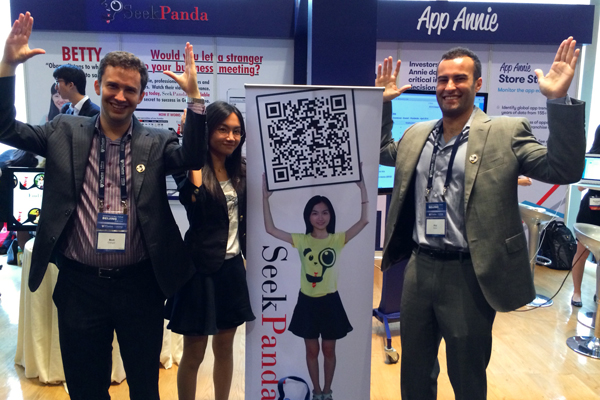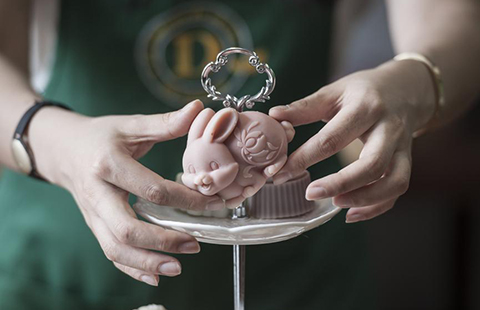Good workers, clear vision vital for US SME success
Updated: 2015-07-04 00:36
By Huang Ying(China Daily)
|
||||||||
|
 |
|
Matt Conger (left) and his business partner Phil Kohn (right) founded US online company SeekPanda, which matches interpreters with consumers. Huang Ying / CHINA DAILY |
For small and medium-sized US companies that want to enter the Chinese market, or have already run a business in the country, finding the right people and staying abreast of market demands and dynamics are the two major factors behind their success.
It didn't take long before high school friends Phil Kohn and Matt Conger decided to start their own business in China. After separately making business trips to China, they immediately sensed the opportunity in China's market — a market that calls for a new kind of interpretation agency to promote a revolution in the traditional industry.
Last year, they started SeekPanda, an online company that matches interpreters with consumers. It's the first business they've launched. So far, the website has raked in about 1,000 interpreters, or pandas, as they're referred to in the system. These registered interpreters are located around the world, with Chinese accounting for about 90 percent.
"It was clear to us that the market for hiring trusted service providers in China was ripe for innovation and needed to be revolutionized," Kohn said in an e-mail to China Daily.
He explained the reason for choosing interpretation for their first business in China.
"In general, unless you use an interpretation agency, it is hard for first-time business travelers to China to find trusted freelance interpreters. At the same time, it is hard for these interpreters to find good clients," he said.
The world of traditional interpretation agencies is full of unfavorable circumstances, including price discrimination and a lack of price transparency within agencies — they often keep much of what the client pays, often well over 50 percent, sometimes up to 70 percent. In addition, agencies bait and switch, meaning they show the resume of one interpreter but then assign a different interpreter to do the job, he said.
At SeekPanda, only 20 percent of commission is required, and this is the startup's only revenue stream.
Over the past year, it has served more than 200 customers in more than 1,000 meetings, including government delegations such as the one led by US Secretary of Commerce Peggy Pritzker, and several of the world's leading expert networks.
SeekPanda's success also has a lot to do with the two founders' clear realization that one of the keys to succeeding in China is building the right connections with the right people and finding the right Chinese partners. "This also relates to trust and the importance of protecting key competitive intel," Kohn added.
To achieve this, they have spent lots of time networking and building relationships with people who have aligned interests with them and work with them to grow together. During the process, they make sure to point out that SeekPanda is a win-win online platform for customers and Chinese interpreters where customers can find better interpreters for more competitive prices and interpreters can have more job opportunities with better clients.
To guarantee the quality of the interpreters, the first wave of about 250 interpreters were all vetted and accredited by the two founders, in person. It's time-consuming but necessary, as Kohn said that when they were forming SeekPanda they saw through using LinkedIn, and found that even if an interpreter looks reliable on paper they might not have adequate IQ and EQ to succeed as a business interpreter.
With its development, these initial interpreters gradually helped to screen and qualify new interpreters.
Other than the two major factors leading to success, the two founders' previous experience in financial services in the US, the trust between them, and the focus on the long-term vision of the company all contributed to company's healthy growth and promising prospect.
Unlike the two founders of SeekPanda, Charles Hubbs, an American living and producing medical products in China since 1989, waited for 10 years before taking concrete actions toward realizing his dream of selling medical devices on the Chinese mainland.
Hubbs first had the idea of expanding to the China market at least a decade ago, but he waited because he found out that hospitals back then were not sufficiently developed to use his products, which are mainly devices offering protection to medical workers in the operating room, including microscope and equipment covers, patient draping, and surgical accessories.
His company, Guangzhou Fortunique Ltd, was established in 1995 as a solely owned foreign enterprise and, in 1997, began selling his products under the brand Premier Guard. The home office of Premier Guard is in Houston, Texas, with its European sales office in the Netherlands.
The company has made on application to sell its medical devices in China. Hubbs said he expects it will be three months before he gets approval, but he's optimistic about the prospect of his business here.
So far, his company has tested Premier Guard products in 20 hospitals in Beijing, Shanghai and Guangdong province and has been in discussions with Chinese medical distributors to market products throughout the country.
"This is the right time to enter the China market, as the hospitals here have developed to a level that advanced medical devices are in demand. Chinese people's average incomes has also increased to the extent that they can afford the services provided by these medical devices," said Hubbs.
Another factor that made Hubbs so confident about his business outlook in China lies in the uniqueness of his products. "Up to now, no Chinese companies manufacture the products we make," he said.
However, Hubbs also expressed his concern of expanding his business in the world's second-largest economy.
"I never exhibit my products in any exhibitions in China, as I found that some Chinese manufacturers have already copied my products. Although they might look alike in appearance, the quality differs greatly," said Hubbs.
He hopes that the government could issue more strict regulations on controlling the qualification of Chinese plants to manufacture medical equipment.
All of the 300 employees in his company in Guangzhou are Chinese, but most are able to speak English. Hubbs said that he will recruit more Chinese for the company's headquarters in Houston who have graduated from US universities.
"I find it easier to recruit Chinese-speaking staff in the US than to recruit English-speaking staff in China, as a person who knows how to speak a language doesn't mean that he can understand completely and communicate free from barriers in this language," said Hubbs.
More than 30 million companies are registered and are active in the US. Many small and medium-sized US companies have the desire to enter the Chinese market, as China's ever-expanding domestic market clearly offers tremendous opportunities for American companies. For these companies, the biggest difficulty of course is their lack of language capability, said Harley Seyedin, president of American Chamber of Commerce in South China.
The chamber is constantly engaged in educating US SMEs on the fact that China now offers highly educated English-speaking Chinese workers and executives, and this can assist them with overcoming the language barrier.
Most US companies established in South China are already profitable and growing at a healthy pace. This is due to their innovation, unique products and services, and their ability of adjusting to the changing and challenging business environment, said Seyedin.
Contact the writer at huangying@chinadaily.com.cn
- Injured ROK tourists in intensive care
- 36 dead, 26 missing after banca capsized in C. Philippines
- Thai navy plans to buy three Chinese subs
- Mass casualties in Indonesian military plane crash
- Japan's LDP lawmaker denounces Abe's security policies
- More than 100 feared dead in Indonesian military plane crash

 Across America over the week (June 26-July 2)
Across America over the week (June 26-July 2)
 Solar-powered plane breaks solo flight record
Solar-powered plane breaks solo flight record
 A soap maker's fragrant life
A soap maker's fragrant life
 Ten photos you don't wanna miss - July 3
Ten photos you don't wanna miss - July 3
 Cooling off to escape the heat wave
Cooling off to escape the heat wave
 Top 10 best hotel booking apps for Android
Top 10 best hotel booking apps for Android
 Western Europe swelters in long-lasting heat wave
Western Europe swelters in long-lasting heat wave
 Top 10 shareholders of AIIB
Top 10 shareholders of AIIB
Most Viewed
Editor's Picks

|

|

|

|

|

|
Today's Top News
For PetroChina, move to Houston pays off
China-France ties 'benefit all'
Concern over US military strategy
Will Alibaba, Amazon clash?
China-France ties 'benefit all'
Veteran diplomat in Havana shortlisted for ambassador
Solar-powered plane breaks solo flight record
California mulls move to 'zero-emission buses'
US Weekly

|

|






